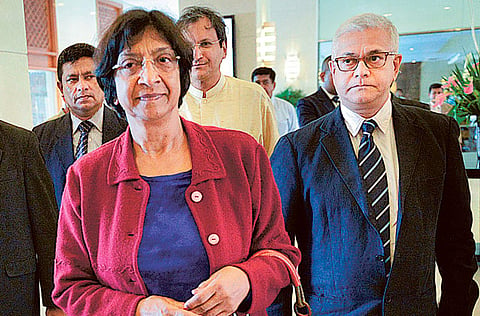UN’s Pillay in Colombo for talks on rights
Opposition says they should be consulted too

Dubai: Navi Pillay, the United Nations High Commissioner for Human Rights, landed in Sri Lanka on Saturday with an undertaking from the government of President Mahinda Rajapakse that there would be no restrictions placed on her visit.
According to Sajin Vass Gunawardena, monitoring minister for external affairs, Pillay was to have access to even the former civil war-torn areas of the country.
During her visit, the Commissioner is scheduled to meet members of Sri Lanka’s United People’s Freedom Alliance to discuss the human rights situation in the country as well as the forthcoming northern provincial council elections.
Pillay’s visit has, however, irked a few prominent Sri Lankans chief among them being former general- turned- politician Sarath Fonseka.
“I thought that she (Pillay) would give us an opportunity to meet her,” stated Fonseka to Gulf News in a telephone interview. “Since she’s looking for important answers, on how human rights are being violated, why doesn’t she contact us as well. She hasn’t even tried.
“If she’s sincere about the purpose of her visit then she must contact us as well. I was once a candidate for the presidential elections. I was put into jail by a dictator president. Let her meet the right people. Her visit must be useful. Sri Lanka has other key influential figures apart from the president.
“If anyone wants to get a clear insight into human rights abuses then I am the person they should contact. I was in charge of the ground offensive and it was the army that faced the brunt of the fighting. We destroyed 23,000 rebels, captured 12,000, lost 5,200 men and had 27,000 injured soldiers. Through it all, we took the precautions necessary at a time of combat.”
The retired general had famously orchestrated Rajapakse’s sanctioned offensive against the Liberation Tigers of Tamil Eelam (LTTE) wiping out the terrorist outfit. He later fell out with the Sri Lankan premier.
In a bid to get back into reckoning and backed by a few political parties, Fonseka put himself up as a candidate for the presidential elections in 2010. He lost, winning 40 per cent of the votes polled, while he was still in jail, accused of trying to assassinate Rajapakse and his family and was released in May 2012. He has since launched his own political party this year called the Democratic Party.
Rajapakse and Fonseka share a strong mutual hatred. It guarantees never to improve. “He (Rajapakse) is a disgraceful dictator,” said Fonseka adding “he is not even a benevolent dictator.”
“We have two main parties in the country: one in the government (United People’s Freedom Alliance) and one in opposition (United National Party). These people have ruled, on and off, sharing power for the last 60 years. In my assessment, 95 per cent of the politicians in both parties are corrupt. They don’t love the country or the people. They are not bothered about development, or the welfare of the people. So, slowly we are going down the drain. It is disgusting.”
Interestingly, Sri Lankan parliament has approved proposals which allow Rajapakse an unlimited number of terms thereby boosting his powers. Ruling out any future negotiations with Rajapakse, Fonseka stated, “I don’t want to waste time on compromises with him. I know his psychology and temperament. He will not make this place worthwhile to live.
“The president is ineffective and his two brothers are not qualified,” Rajapakse added. ‘One handles the economy and the other is in charge of defence. The later hasn’t even lived in the country for the past 15 years. He has no clue about what the army, or the people, went through but he is writing books about this now. How can a civilian make plans for defence? This is nonsense.”


